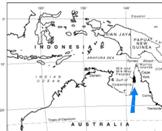Wik
You need to have the Flash Player installed in your browser in order to use the audio player.
Wik refers to the Aboriginal nation of the Wik-Way people in the Cape York area of Queensland. Much of western Cape York where the Wik people live is occupied by very large cattle properties, and many of these are owned by large Australian and multinational corporations. The Wik were among the first Aboriginal people after Mabo to seek clarification of Native title. They could show a continuous connection with their traditional lands which they shared with the cattle owners. The High Court of Australia determined that Native title could co-exist with pastoral leases. Both could use the same land. Through negotiation, the Wik people could maintain their camps and access to ceremonial and sacred sites while the pastoralists could graze their cattle.
You need to have the Flash Player installed in your browser in order to use the audio player.
The Wik decision sent alarm bells through some sections of the Australian population including the Federal Government. John Howard, then leader of the Liberal Party and Prime Minister of Australia, proposed ten points to ensure ‘certainty’ for pastoralists. Among much controversy, these were incorporated in a Bill that went before Federal Parliament and which was passed in 1998 as the Native Title Amendment Act (NTAA). The Wik decision was significant for a number of reasons. Those who leased land for grazing livestock did not have exclusive use of the land, and did not own it but as a result of the NTAA, they could now engage in all forms of primary production and tourist activities. Native title holders whose land was subject to pastoral leases were to have no right to negotiate. Where Native title holders and pastoralists co-existed, Native title holders were to have the right to negotiate once only. The legislation brought greater certainty for pastoralists and miners and actually increased their rights. Pastoral and mining production could now be guaranteed across Australia. For those holding Native title it was a setback. Their rights to negotiate were limited and where there was conflict, the rights of the pastoralist were to prevail. See this diagram (.pdf 170kB) explaining the conditions of the legislation. |
Traditional lands of the Wik people. Click to enlarge. |
